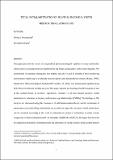| dc.contributor.author | Brumovská, Tereza | |
| dc.contributor.author | Brady, Bernadine | |
| dc.date.accessioned | 2021-06-23T07:25:37Z | |
| dc.date.available | 2021-06-23T07:25:37Z | |
| dc.date.issued | 2021-06-22 | |
| dc.identifier.citation | Brumovská, Tereza J., & Brady, Bernadine. (2021). Initial Motivation of Mentors in Formal Youth Mentoring Relationships. Child Care in Practice, doi:10.1080/13575279.2021.1929845 | en_IE |
| dc.identifier.issn | 1476-489X | |
| dc.identifier.uri | http://hdl.handle.net/10379/16826 | |
| dc.description.abstract | The paper presents results of a phenomenological longitudinal qualitative study undertaken with mentors associated with the Big Brothers Big Sisters programme in the Czech Republic. Ten mentors were interviewed during the first month and after 5 and 10 months of their mentoring involvement employing phenomenological in-depth semi-structured interviews. Interpretive Phenomenological Analysis (IPA) was subsequently applied using QSR NVivo software for data analysis. This paper reports the findings of an IPA analysis of one of the central theme of mentors‘ experience, common to all interviewed mentors: initial motivation to volunteer in formal youth mentoring relationships (FYMRs). The findings of the IPA analysis are discussed using the framework of self-determination theory (SDT) with its continuum of autonomous and controlling motivations. As a result, we argue that the initial motivations of mentors can be assessed according to the level of autonomy in mentors' motivation, in other words, congruence of their motivations with the authentic self. We argue that the level of congruence of mentors‘ motivation with the authentic self can be considered as the quality feature of the mentors’ motivation. We conclude that, in theory, this feature has an impact on the subsequent dynamics and perceived satisfaction of formal youth mentoring relationships. We recommend that the mentors‘ motivation, and specifically, the level of autonomy in mentors‘ motivation to volunteer with socially disadvantaged children be assessed in mentoring programmes as a qualitative feature in mentorś training and recruitment. | en_IE |
| dc.format | application/pdf | en_IE |
| dc.language.iso | en | en_IE |
| dc.publisher | Routledge | en_IE |
| dc.relation.ispartof | Child Care In Practice | en |
| dc.rights | Attribution-NonCommercial-NoDerivs 3.0 Ireland | |
| dc.rights.uri | https://creativecommons.org/licenses/by-nc-nd/3.0/ie/ | |
| dc.subject | youth mentoring | en_IE |
| dc.subject | motivation | en_IE |
| dc.subject | Self-determination theory | en_IE |
| dc.subject | IPA | en_IE |
| dc.title | Initial motivation of mentors in formal youth mentoring relationships | en_IE |
| dc.type | Article | en_IE |
| dc.date.updated | 2021-05-04T19:14:25Z | |
| dc.identifier.doi | 10.1080/13575279.2021.1929845 | |
| dc.local.publishedsource | https://doi.org/10.1080/13575279.2021.1929845 | en_IE |
| dc.description.peer-reviewed | peer-reviewed | |
| dc.internal.rssid | 25892794 | |
| dc.local.contact | Tereza Brumovská. Email: tereza.brumovska@nuigalway.ie | |
| dc.local.copyrightchecked | Yes | |
| nui.item.downloads | 90 | |


